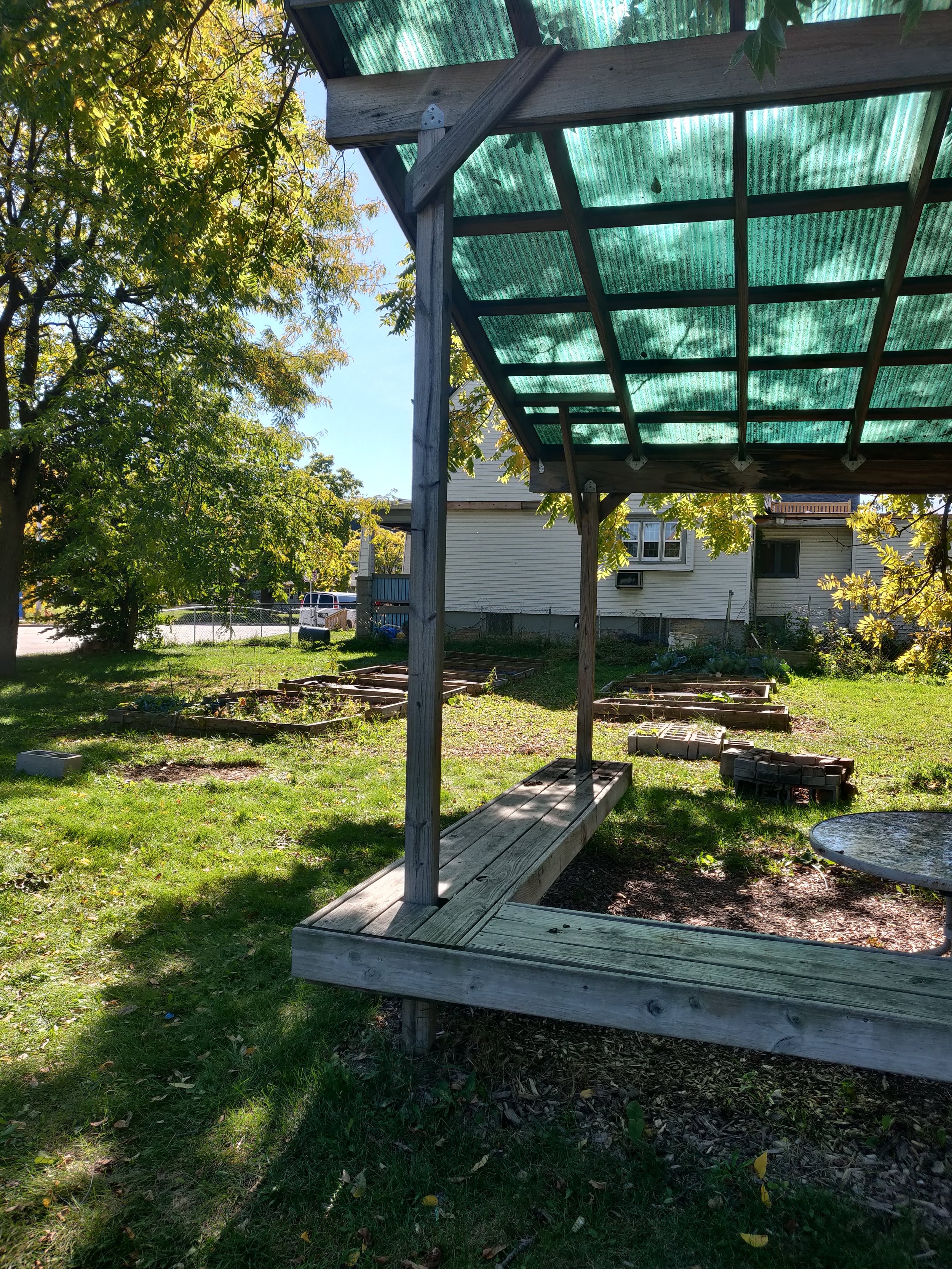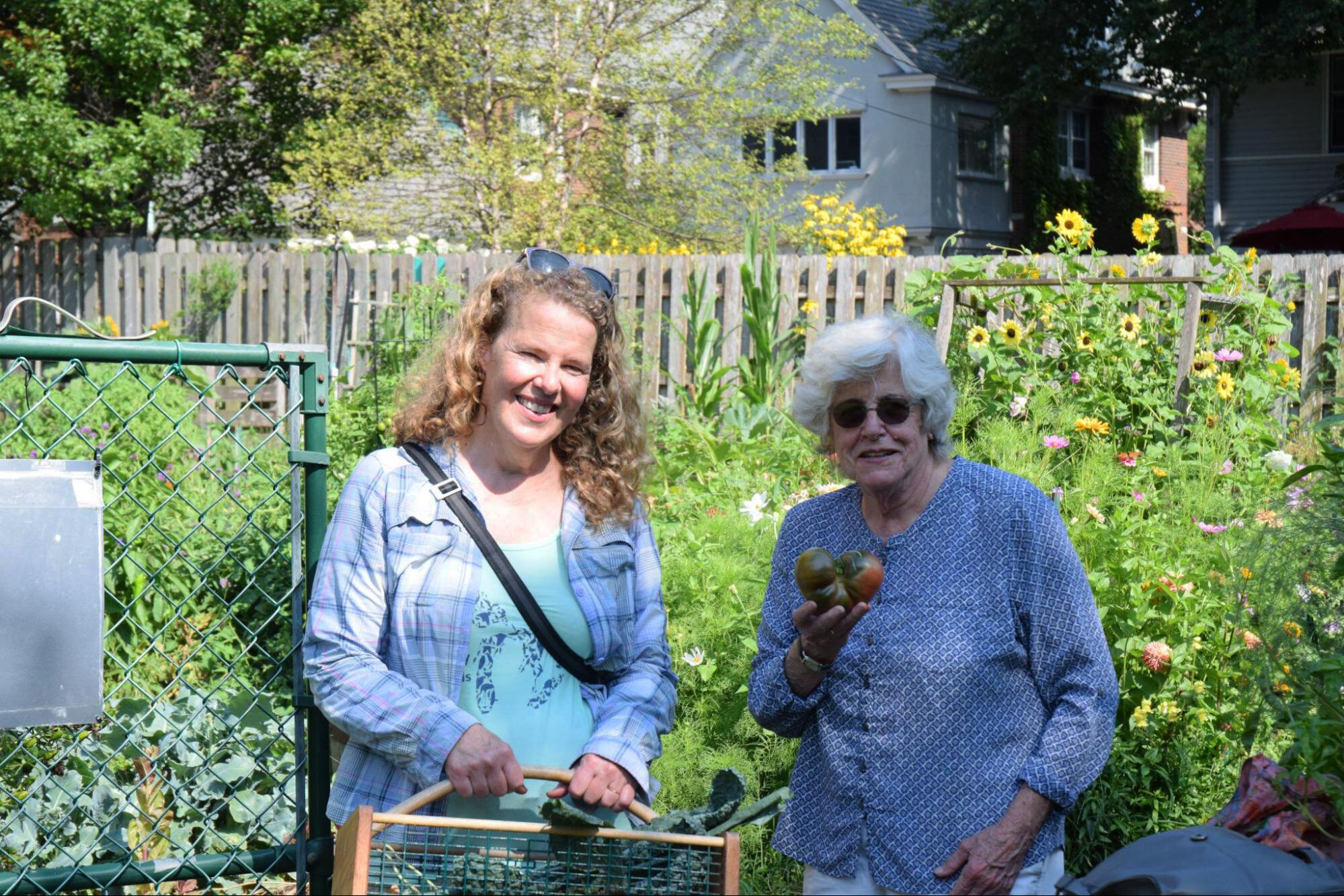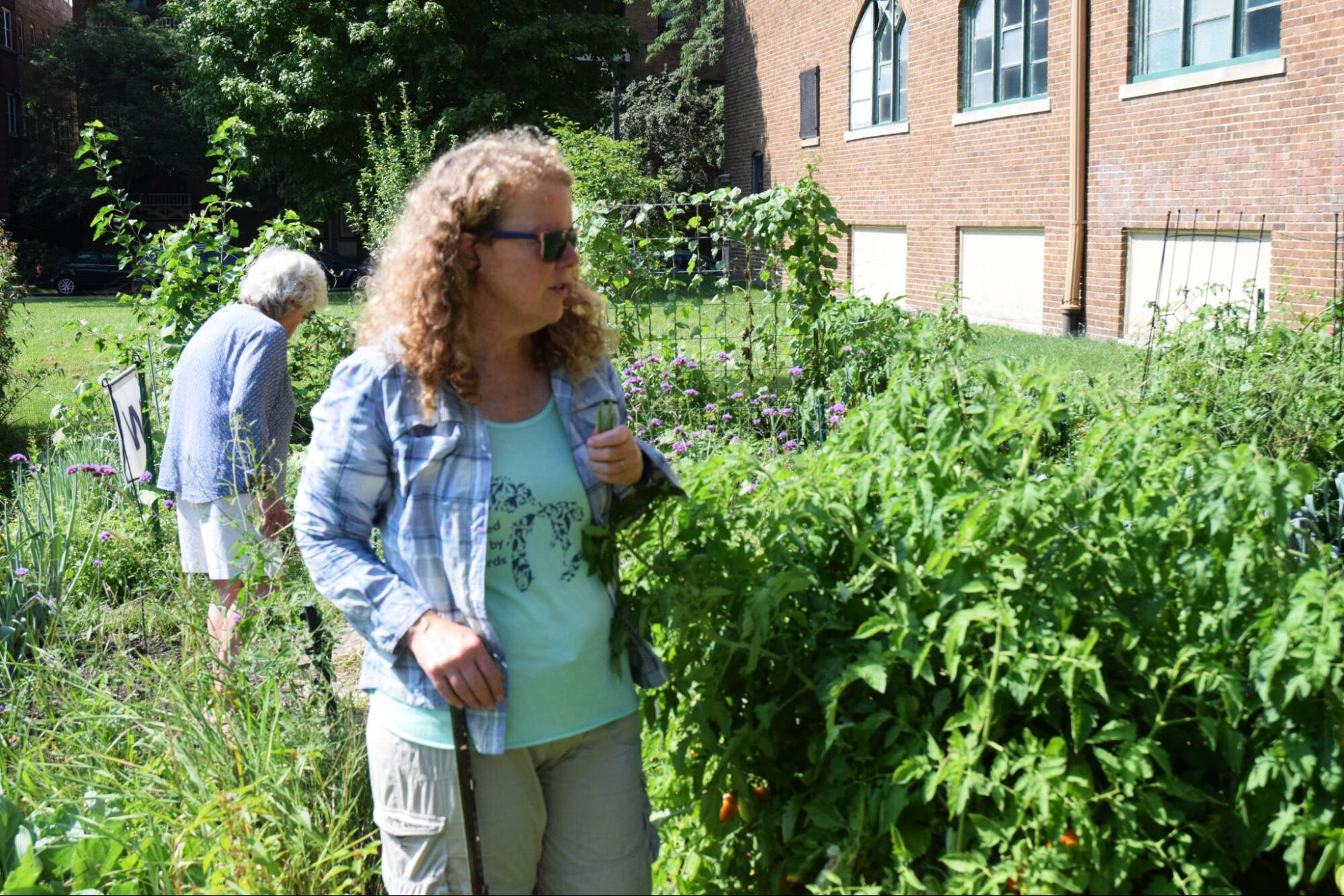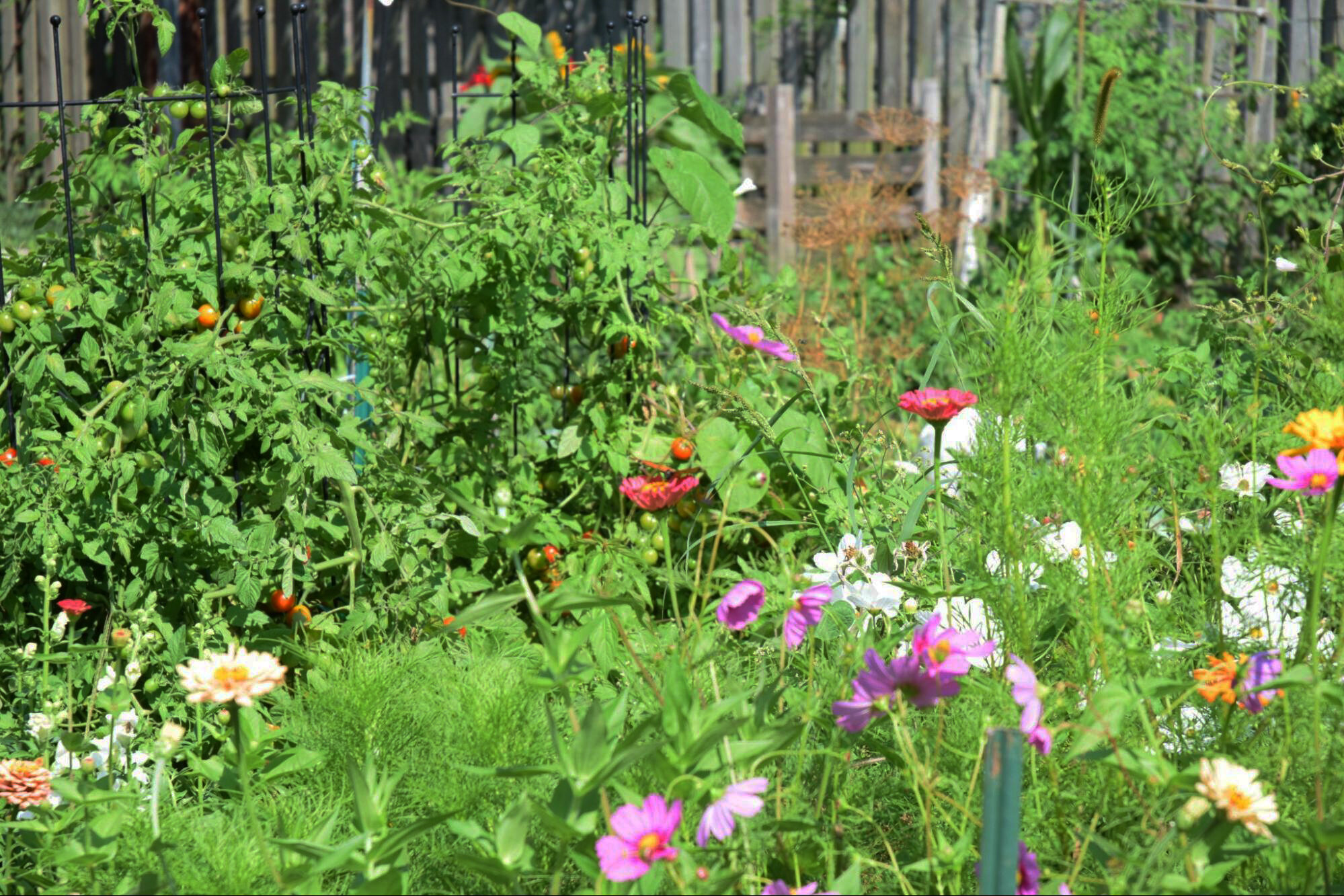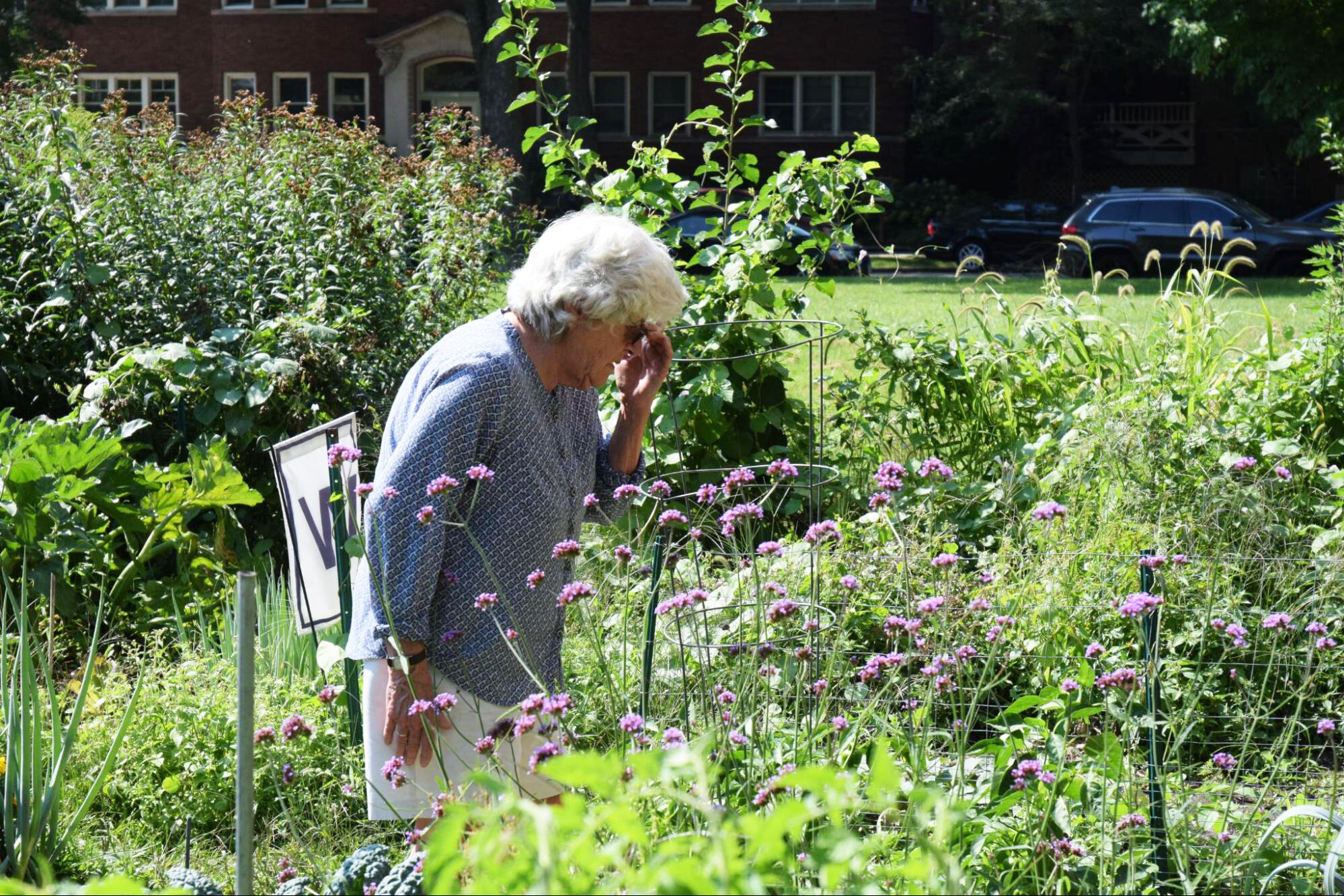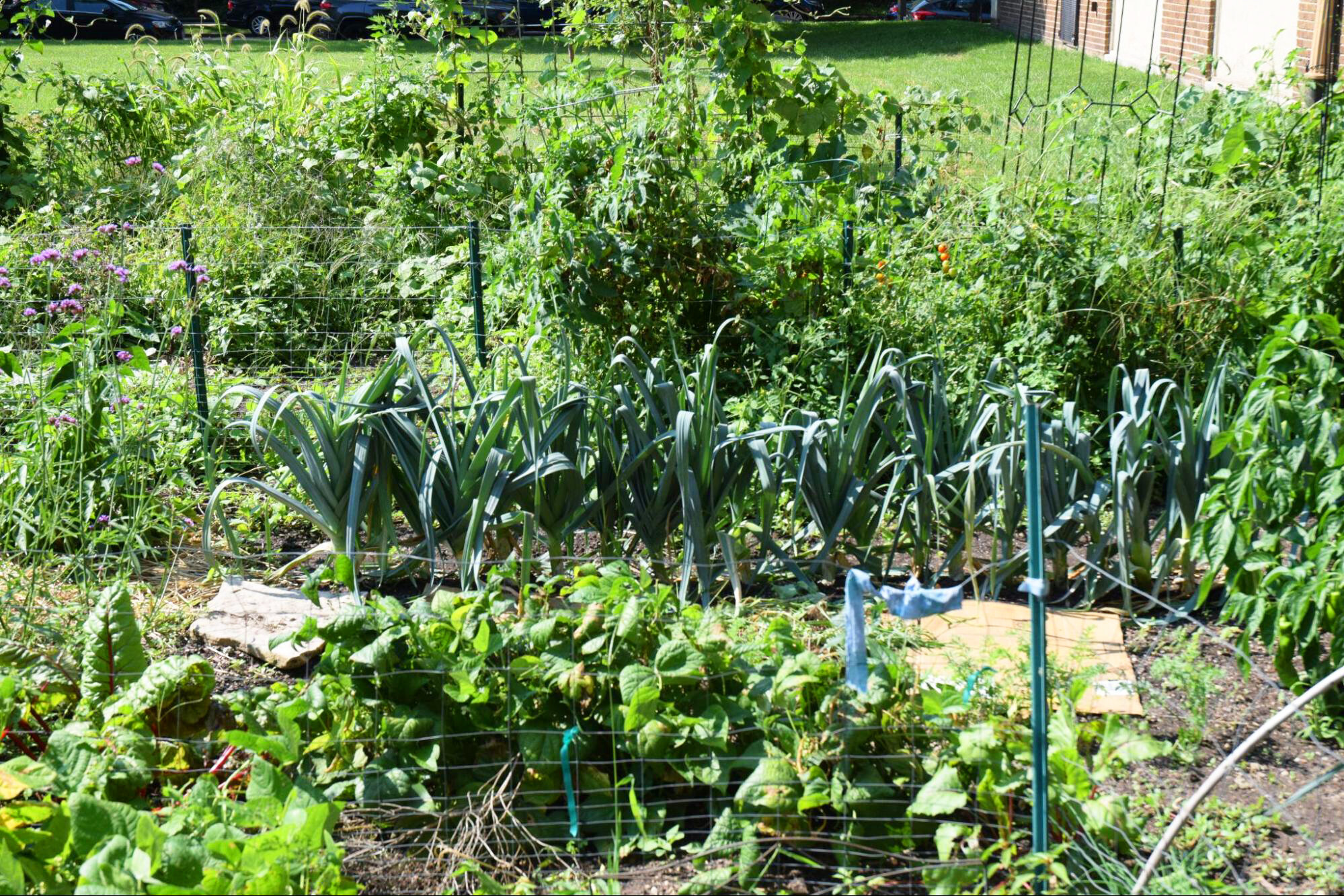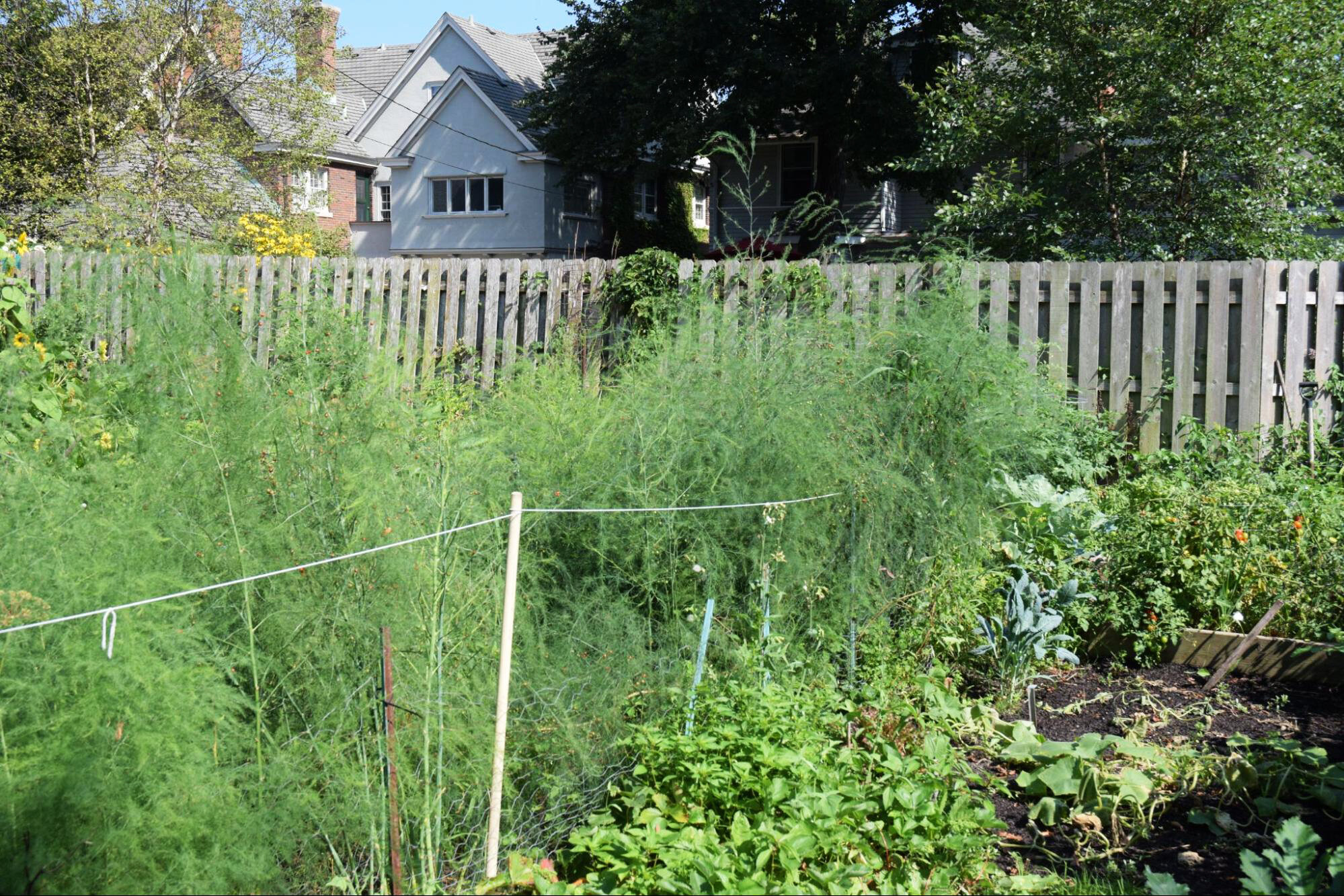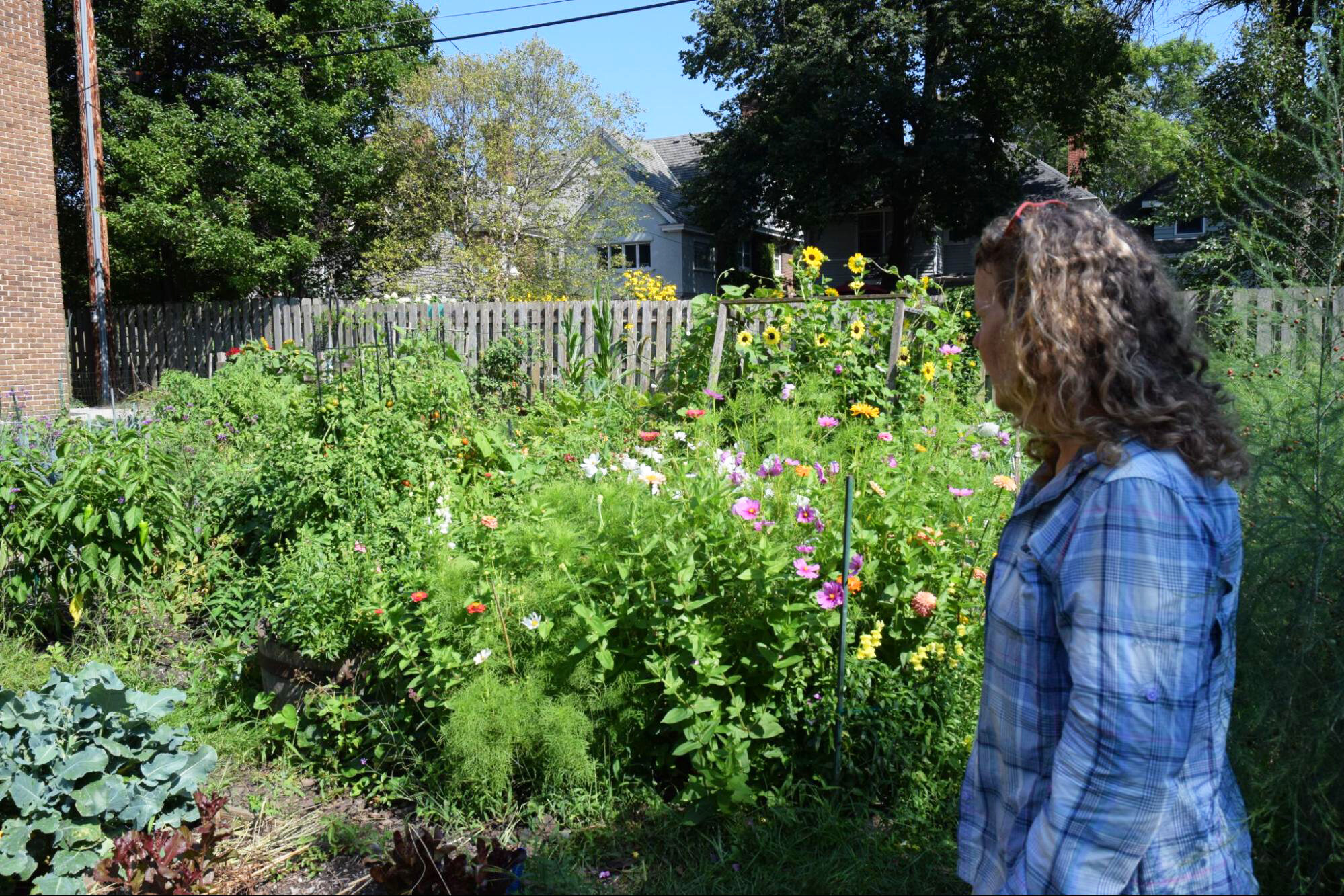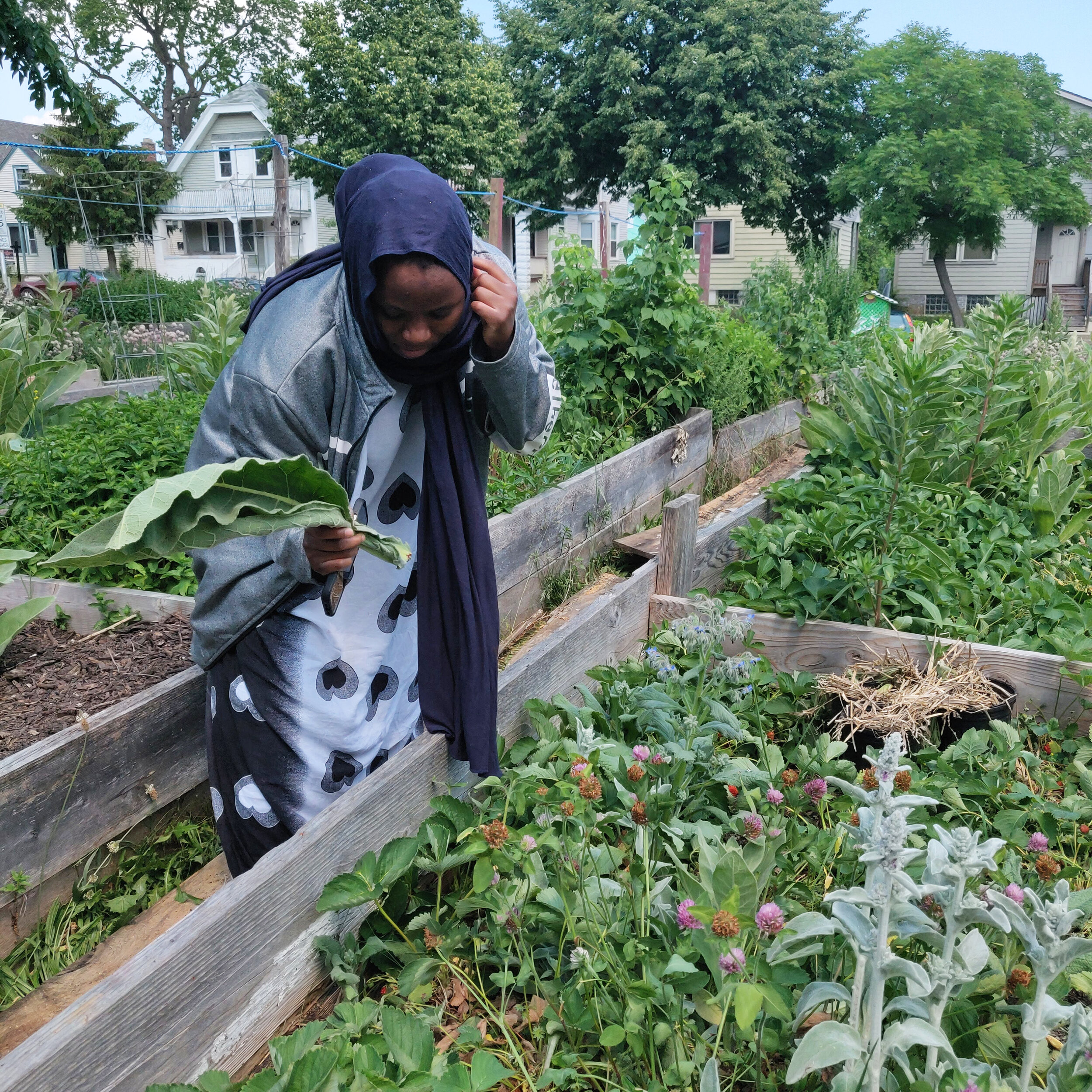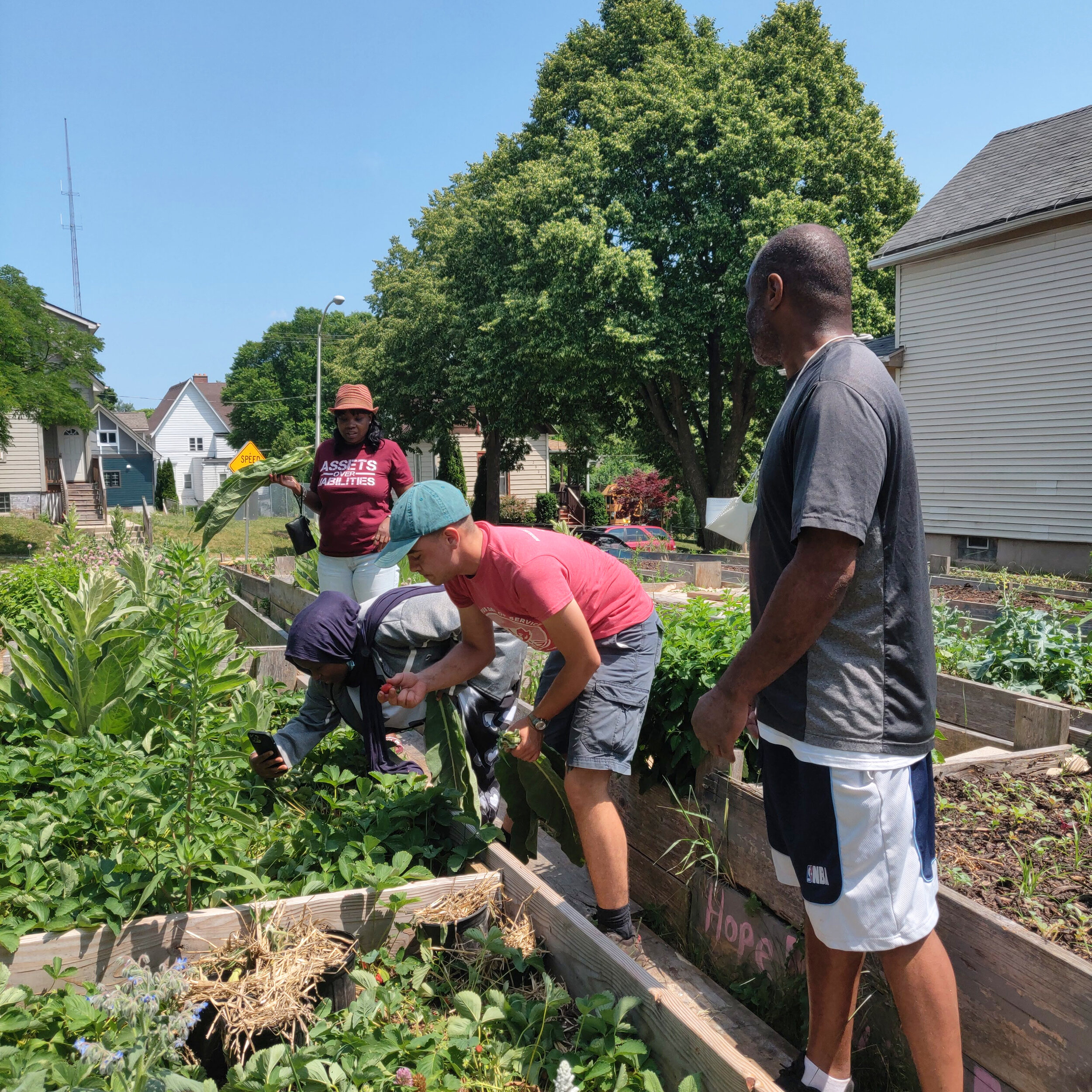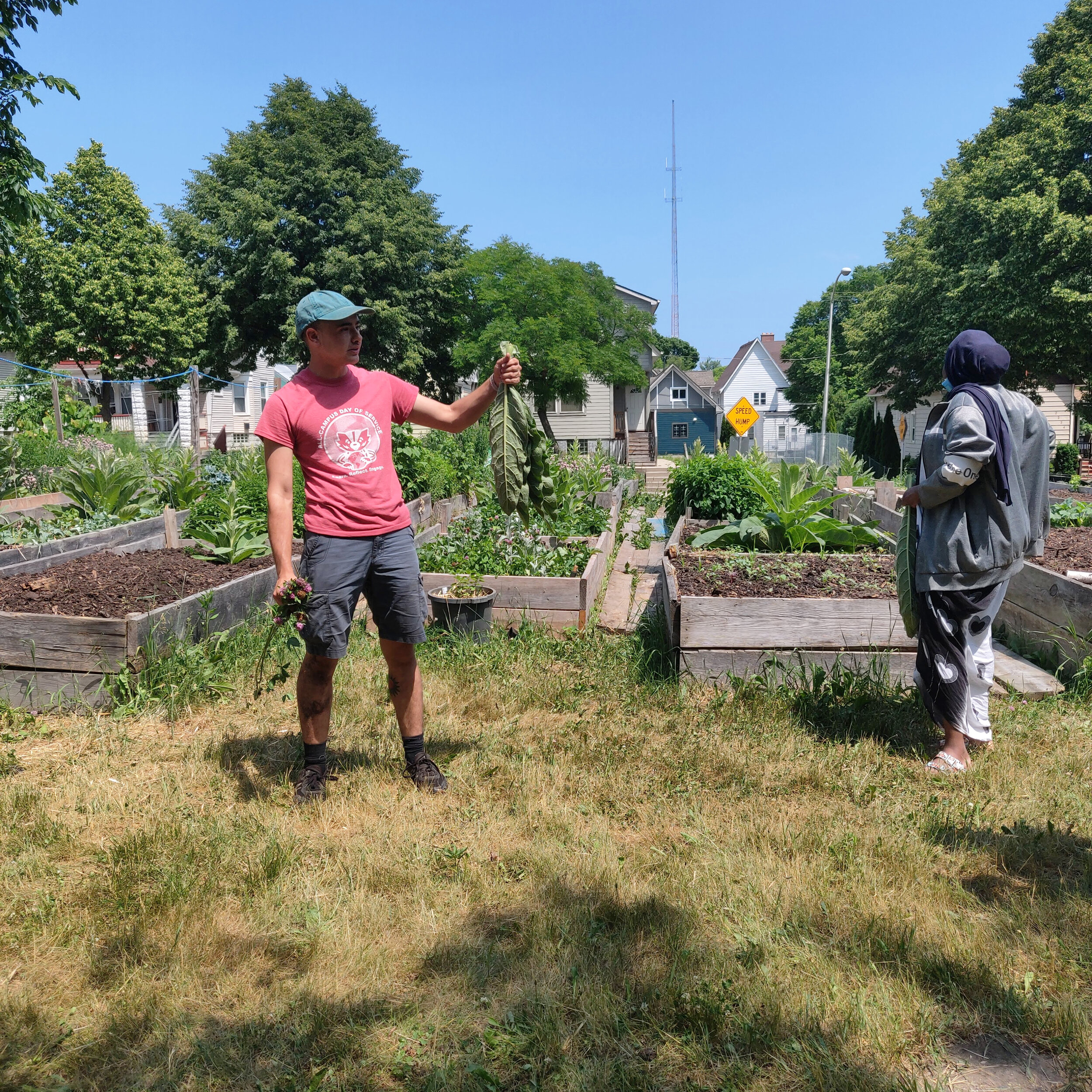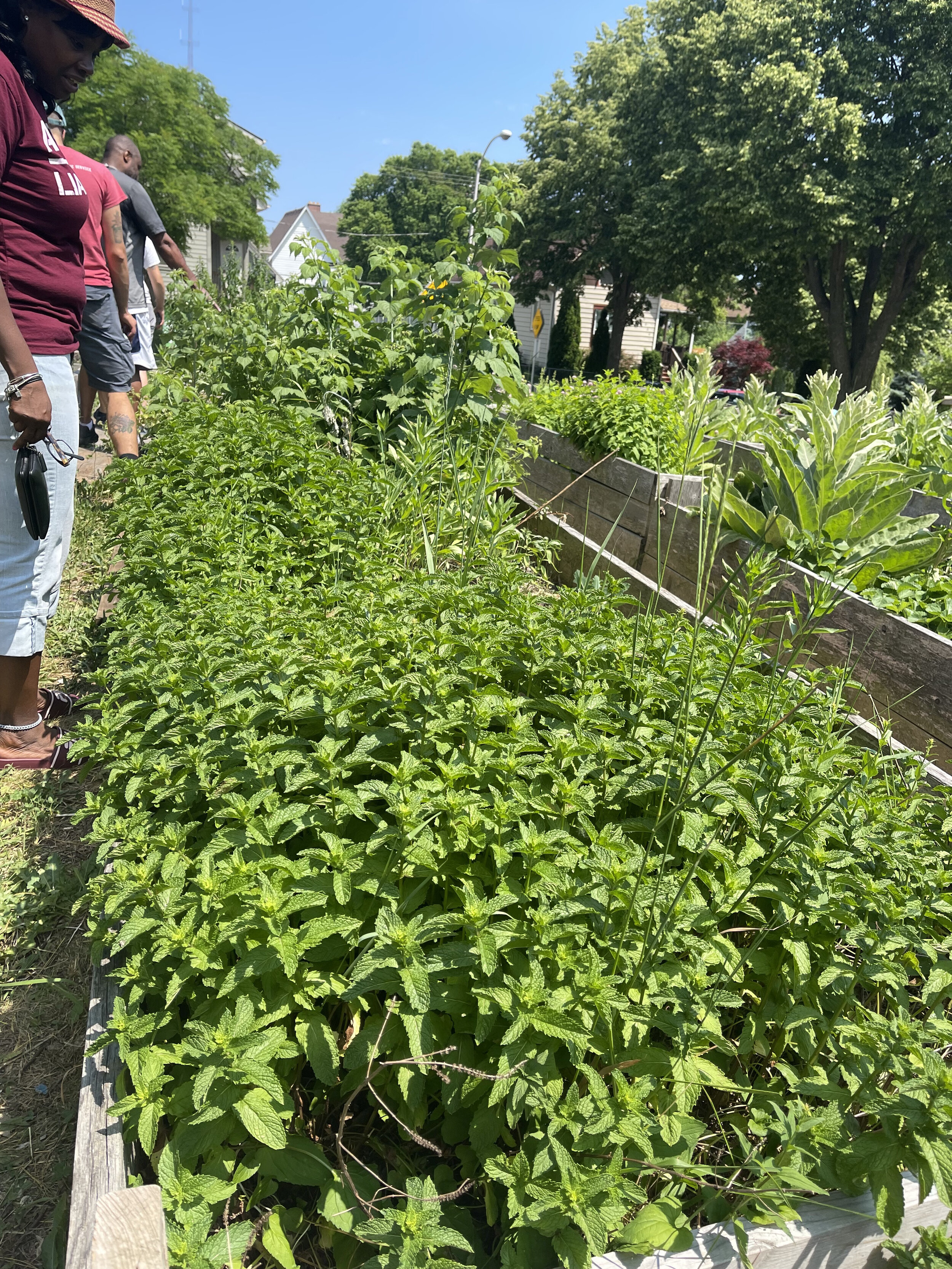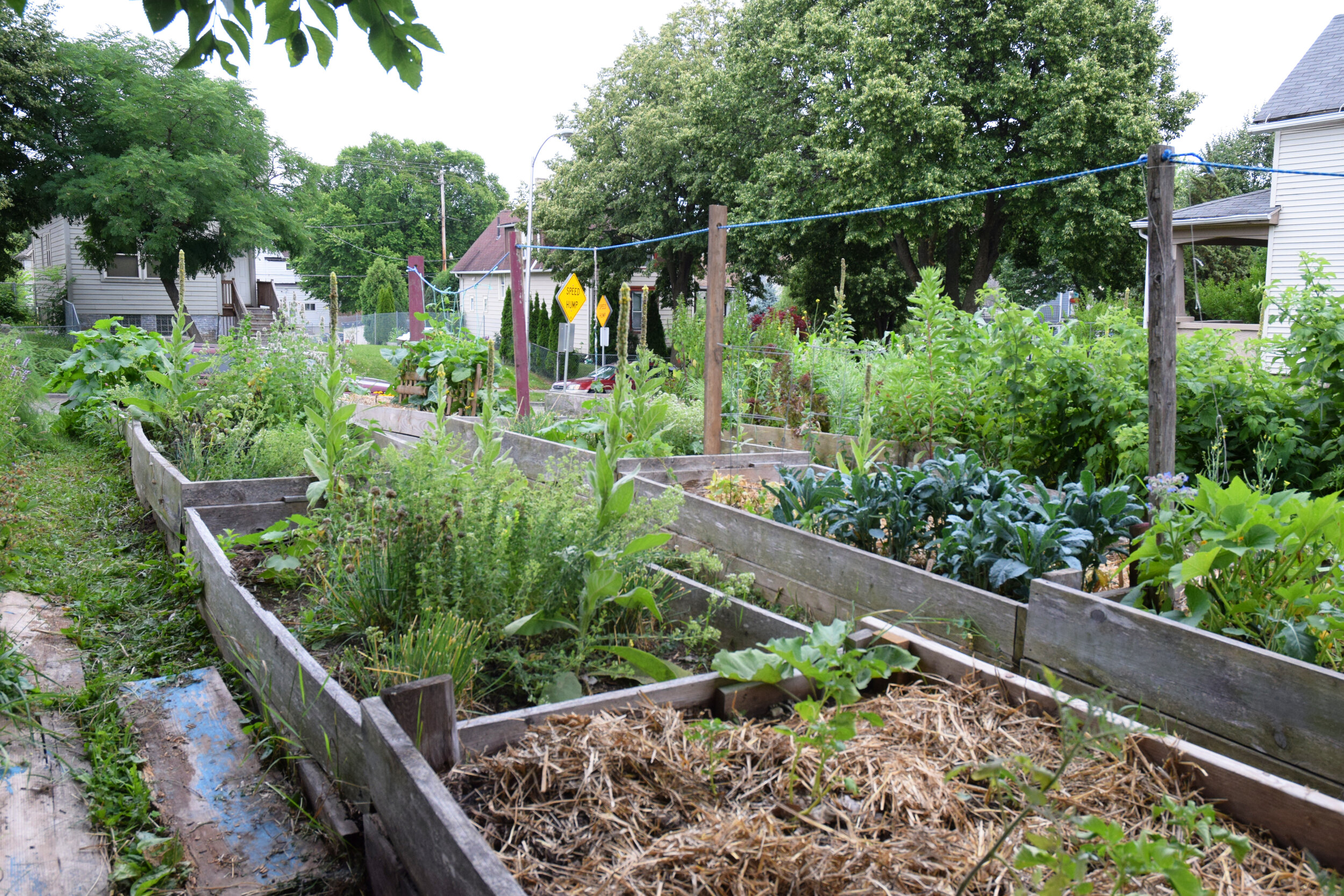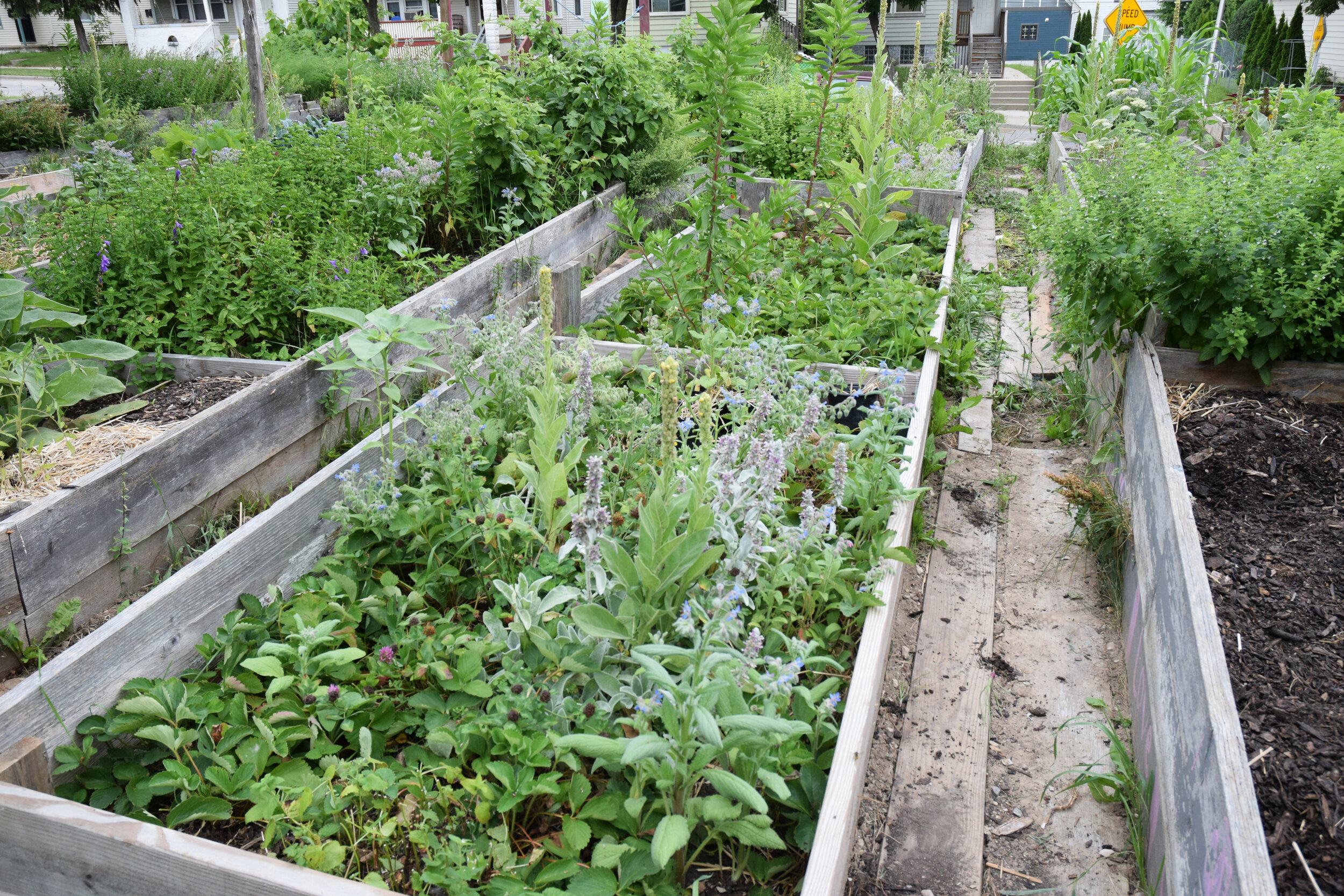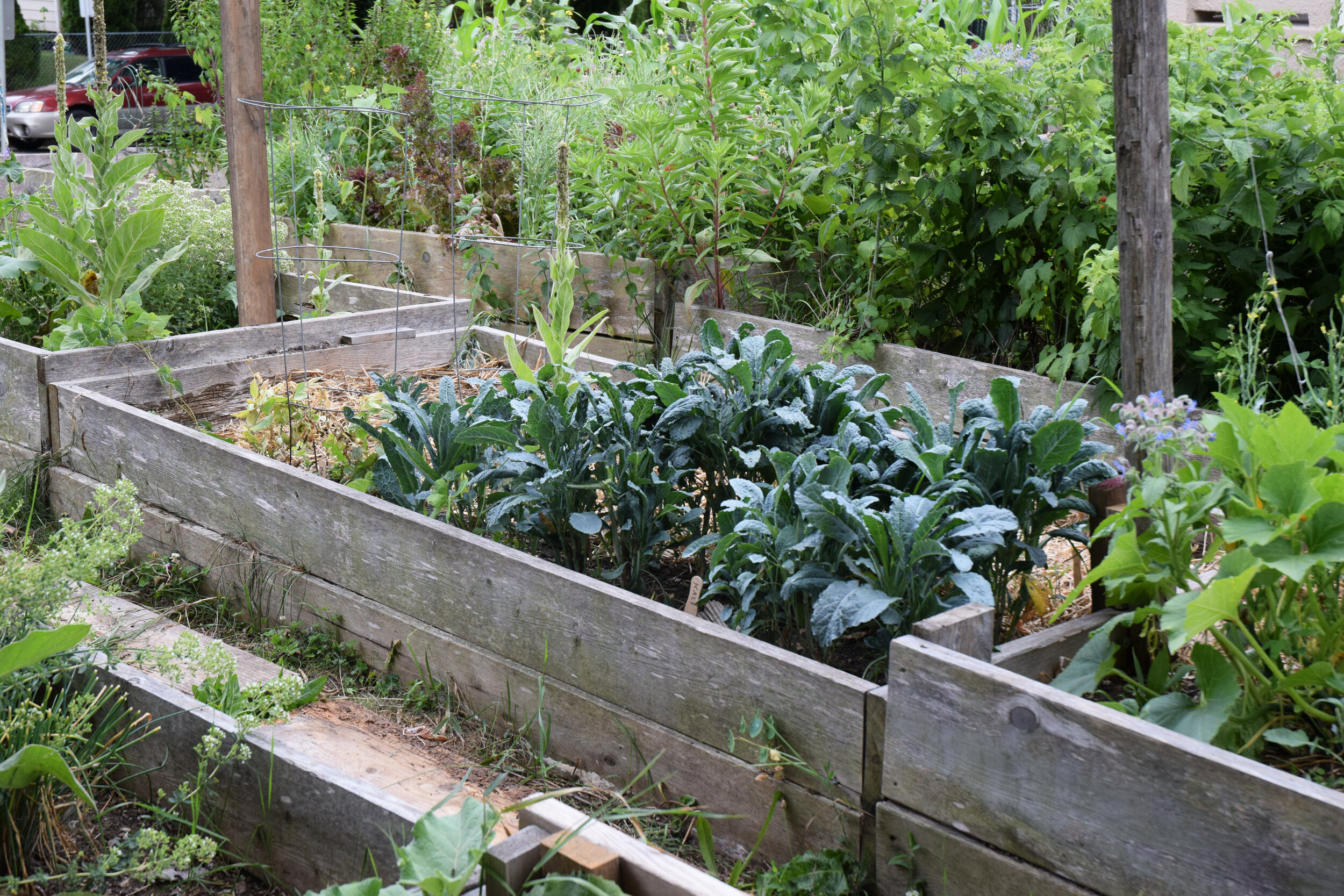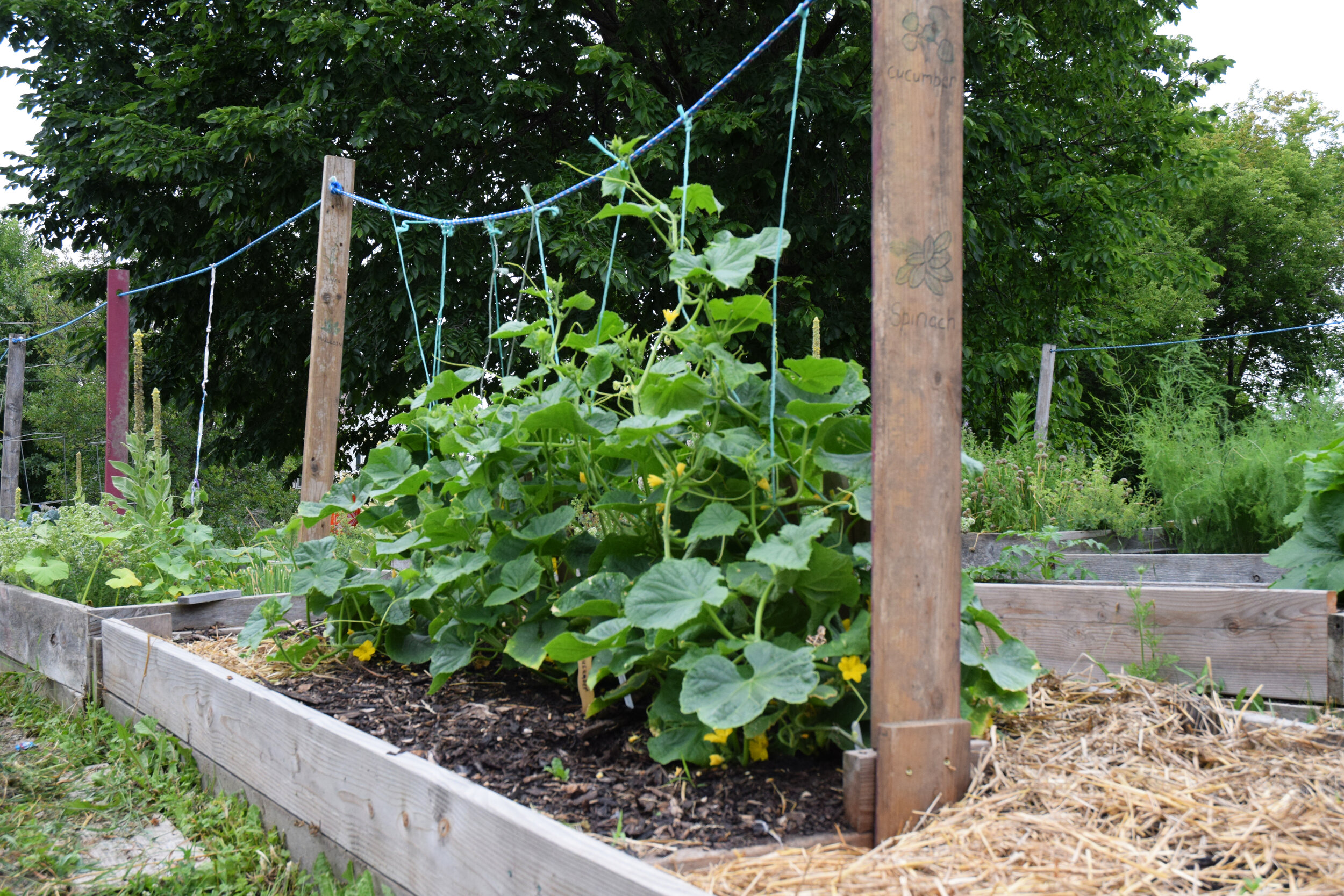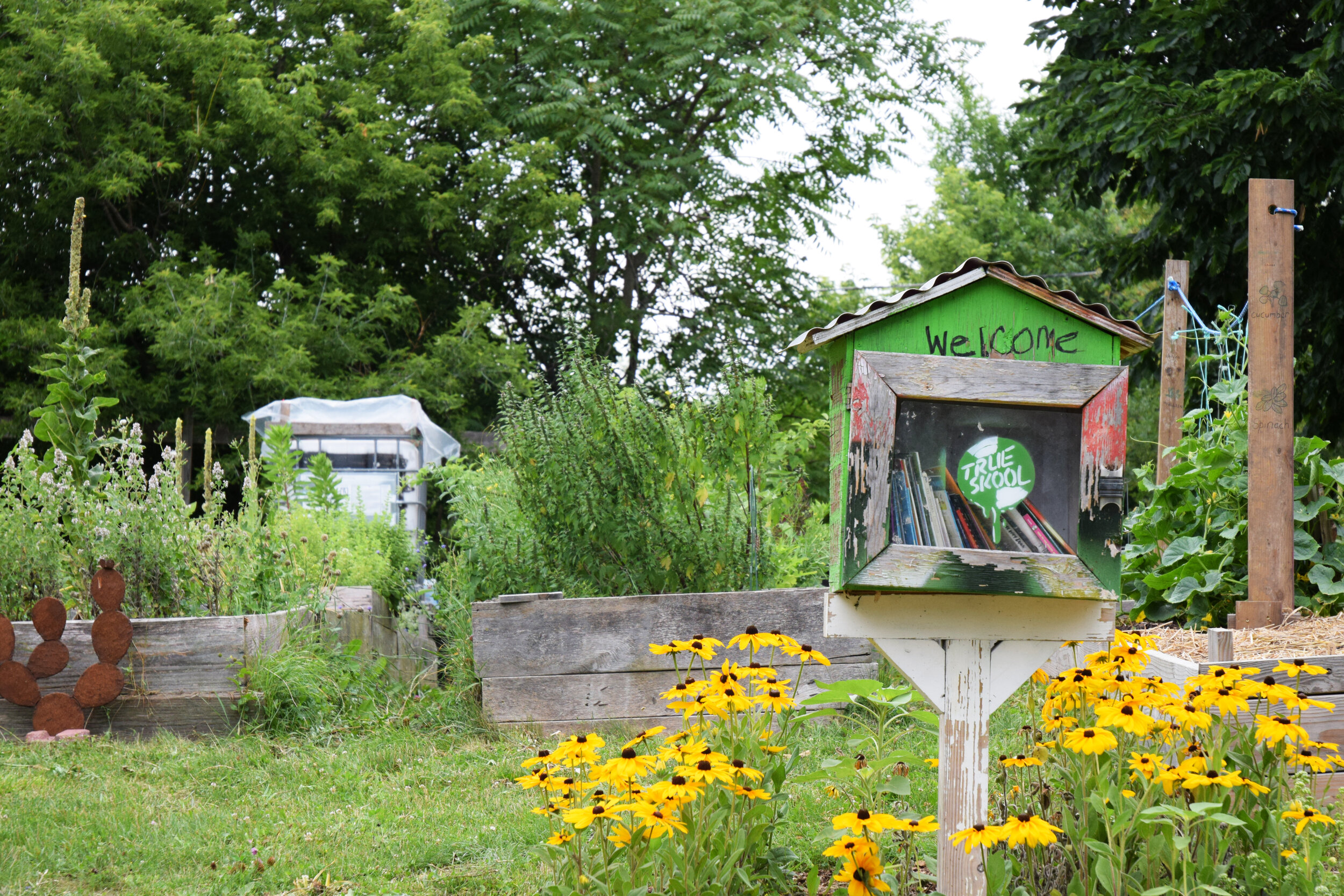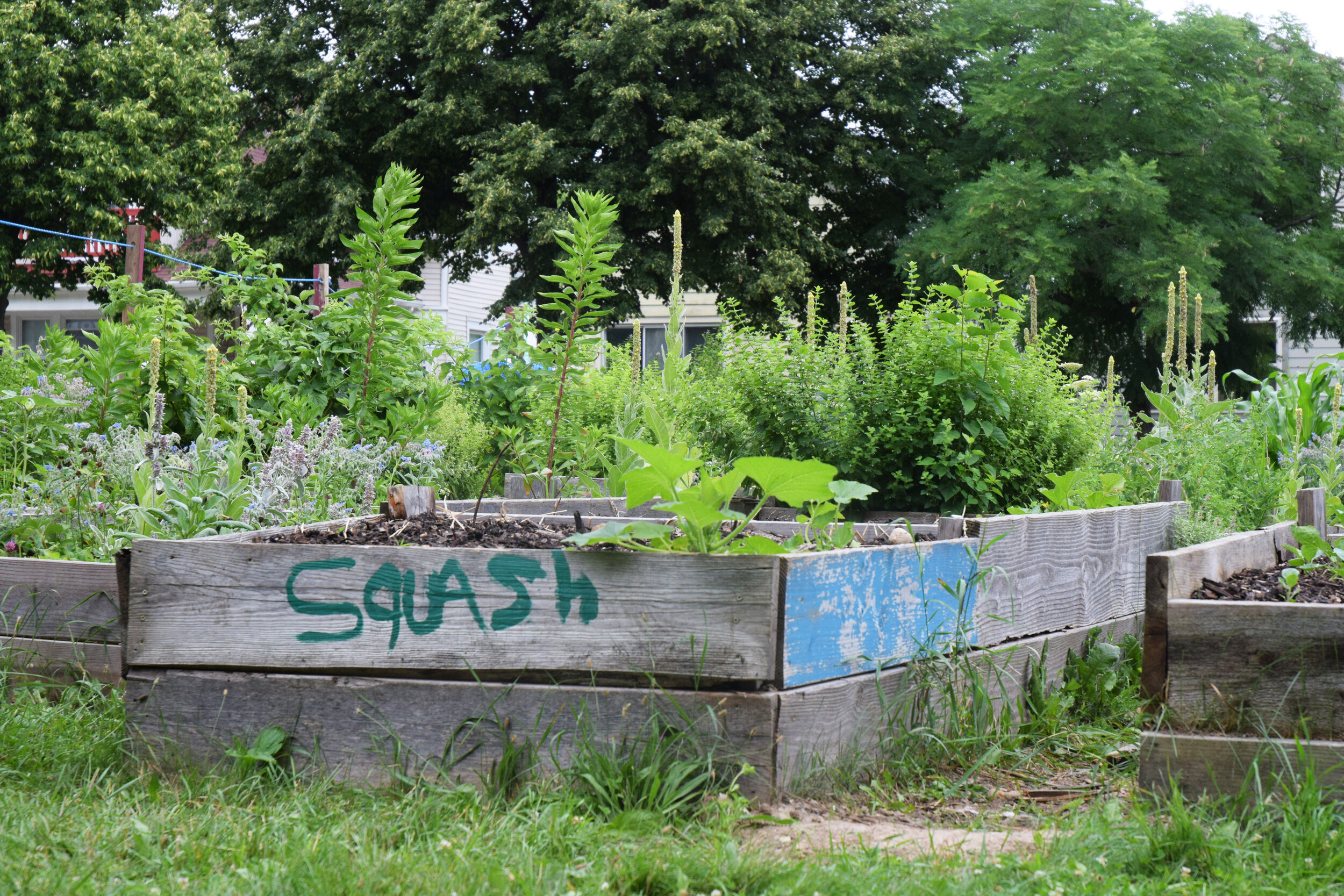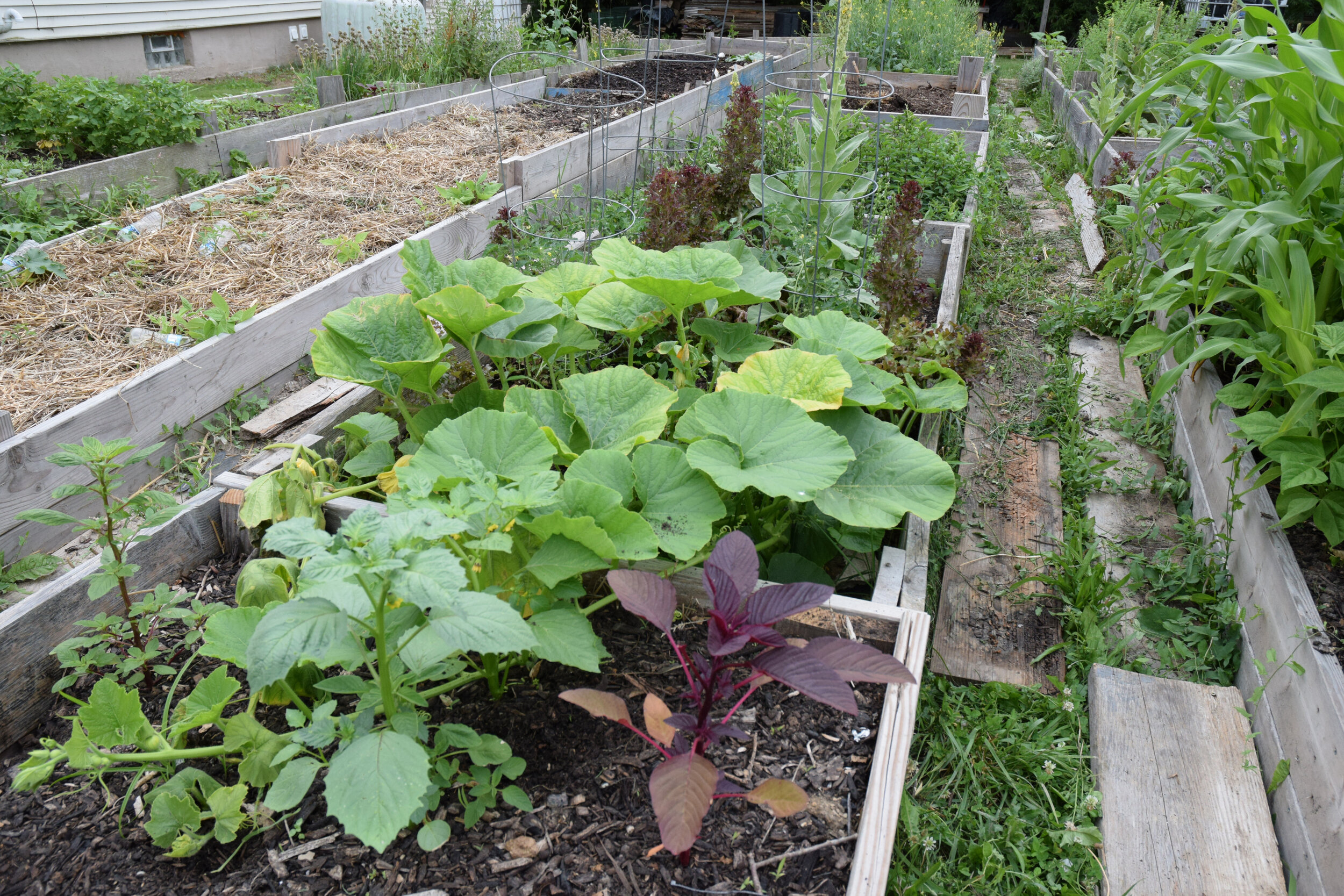Community Spotlight: Karma Community Garden
The mission of Karma Community Garden is to provide an outdoor classroom where STEAM education is the focus, providing various career paths and resources in an outside environment. We want to enthrall the community by physically interacting with the dirt and learning soil and food science, activating outdoor learning. However, the primary mission of Karma Community Garden is to gather and organize the community while providing a space to demonstrate advanced vertical farming practices.
Just as the work in the garden changes over the growing season, the majority of community gardens tend to have their own life cycle, where productivity and commitment changes as well. Over time, the specific group of folks that came together to garden & bask in the glory of their community greenspace may find themselves unable to care for the garden for a variety of reasons – whether it be a growing family, illness, death, or moving away. Of course, with one garden’s finish comes a new garden’s beginning. While the garden Reformation Angel is no more, we can introduce the Karma Community Garden taking its place at 2129 N. 35th St.
Who leads the garden?
Karma Community Garden is led by Detaya Johnson, a graduate of the University of Wisconsin- Milwaukee. She is an awarded presenter and researcher who has traveled internationally to present at conferences and universities. She has taught Water Quality and Introduction to Geology at the University of Milwaukee-Wisconsin. She has internship experience with The Racine Health Department and The United States Geological Survey. She worked closely with professors to help create a National Science Foundation grant to mentor students who expressed interest in STEM fields. She is an Executive Sales Manager and Project Manager for a commercial and residential landscaping company, All Season Lawn Care & Landscaping.
What is the mission of the garden?
The mission of Karma Community Garden is to provide an outdoor classroom where STEAM education is the focus, providing various career paths and resources in an outside environment. The primary mission of Karma Community Garden is to gather and organize the community while providing a space to demonstrate advanced vertical farming practices. Detaya's mission for the garden is to involve the Department of Children and Family Services and young single mothers in the Washington Park area. When you add diversity into STEAM fields, you heal the community while broadening the minds of the future.
What events will be happening at the garden?
Karma Community Garden plans to have an opening event on May 20th from 11am-2pm: highlighting diverse individuals from different universities and hosting an employment and resource fair in the main field.
Karma Community Community Garden May 20th Schedule:
Introduction
Food giveaway
Co-op sign-up
During the summer, Karma Community Garden will have job training, AODA classes, parenting classes, bike rides, yoga classes, camp giveaways, and educational events. The plan is to get as much free or subsidized programming as possible using grant funding to reduce the cost to the community. They plan to survey the community in mid-May to see what additional resources the community desires for that location.
If you’re interested in learning more or getting involved, you can reach Detaya at detayajohnson@gmail.com.
Community Spotlight: St. Marcus Donation Garden
On North Hackett Avenue, between Belleview and Park Place sits St. Mark's Episcopal Church. In the back corner, past the parking lot, sits a small but lush garden space. Gardeners, Meg Edwards, Jane Shero, and Deacon Michelle Mooney are giving a tour of the space. “The space is about 20 years old. We took the turf out, brought sand in – it’s very clay-y here. Every year we would lay down mulch and compost, and now it grows a little bit of everything.”
On North Hackett Avenue, between Belleview and Park Place sits St. Mark's Episcopal Church. In the back corner, past the parking lot, sits a small but lush garden space. Gardeners, Meg Edwards, Jane Shero, and Deacon Michelle Mooney are giving a tour of the space. “The space is about 20 years old. We took the turf out, brought sand in – it’s very clay-y here. Every year we would lay down mulch and compost, and now it grows a little bit of everything.”
Deacon Michelle Moonie has been serving St. Marcus since 2002, and led the building of the garden. “Creating this garden was a classic diaconal service. Helping people get together to do something in the community. This is an attempt to get people working together, get people to know each other, and now I’ve gotten caught up in it, too!”
Three out of the thirteen garden beds available in this space are dedicated to growing for donation. The three beds are flourishing with leeks, beets, tomatoes, kale, lettuce, peppers, beans, corn, and more. As we speak, Michelle starts looking at the corn next to us. “Meg says not yet!” Jane adds, “They’re not nearly brown enough.”
Jane wears a simple flannel and talks in detail, with love, about what’s growing. She has become a regular donor to Groundwork Milwaukee’s garden gleaning program using the Fresh Food Connect mobile app.
“Two – three years ago, I tried to take my excess produce to a local food pantry. It couldn’t seem to sync up – when they needed what I had. It was so frustrating. When I learned about Fresh Food Connect, it was a no brainer. I just have to do what I do best, which is grow, harvest, and put it on my front step. I’ve always understood the concept of sharing food and feeding others who are in need, but that phrase ‘food justice’ has really resonated with me. It’s short enough but complete enough to explain what you’re about. If you’re trying to give people justice by giving them the basics of what they need, that’s immediately understandable.”
These garden beds are stewarded by both new and experienced gardeners. Jane says, “I’ve been a vegetable gardener for forty years, and I’m pretty sure I would lose my marbles if I didn’t have my fingers in the dirt.”
Meg Edwards had been familiar with food pantries through volunteering with local food justice organization, The Gathering. “I never did vegetables before, but seeing what Jane and Michelle and all the gardeners do, it’s phenomenal. So with this year, it was like – I want to be part of that!”
These small beds have donated a collected 145 lbs of produce this summer, which has then been donated to the pantry shoppers of Solomon Community Temple and Interchange Food Pantry. A little love in a well tended garden can end up making a big difference.
Community Spotlight: Hilltop Community Farm & Garden
In the Harambee neighborhood on Buffum Street, right between Meinecke and North Avenue, lives Hilltop Community Farm & Garden. The first thing you notice when you visit the space are the garden beds. There are fifty of them in total, each is 4’x 8’, laid out in long lines with skinny pathways in between each strip. Many perennial herbs are in full bloom at this point in the growing season. Massive stalks covered in flowers dominate the view. As you walk down the rows, you’ll see the picnic table and chairs under the tree, inviting you to take a rest and enjoy the view. The garden is a hodgepodge of scrapped and recycled materials that have been arranged to create a vibrant green pocket in Harambee where gardeners use all types of growing techniques to raise a diverse variety of fresh food.
In the Harambee neighborhood on Buffum Street, right between Meinecke and North Avenue, lives Hilltop Community Farm & Garden. The first thing you notice when you visit the space are the garden beds. There are fifty of them in total, each is 4’x 8’, laid out in long lines with skinny pathways in between each strip. Many perennial herbs are in full bloom at this point in the growing season. Massive stalks covered in flowers dominate the view. As you walk down the rows, you’ll see the picnic table and chairs under the tree, inviting you to take a rest and enjoy the view. The garden is a hodgepodge of scrapped and recycled materials that have been arranged to create a vibrant green pocket in Harambee where gardeners use all types of growing techniques to raise a diverse variety of fresh food.
“I think community greenspace is an undeniably essential part of life. You can’t just have a concrete jungle. Our brains are hardwired to be outside, to play around. You can’t just be in a house all day. Greenspace creates these safe spaces for people to have genuine interactions.”
This quote is from Nick Montezon, Groundwork Milwaukee’s Field Operations Manager and the main garden steward of Hilltop. He took the space over after it had been abandoned by a previous garden leader. Garden abandonment is an unfortunate but understandable reality in the nature of volunteer-run greenspace. Community gardens require time, energy, and love from all types of neighbors to remain vibrant neighborhood assets. Nick took over the space in 2016, and after surveying the neighborhood, re-named what was previously Harambee Homestead to Hilltop Community Farm & Garden.
“A neighbor told me about this song that came out - like the Hilltop Gang in the 90s and that people on this block were claiming that they were part of the Hilltop. I just liked the name.”
With paperwork signed and Nick listed as the new garden leader, he got to work building the garden from the ground up. Using scrapped wood left over from Groundwork projects, found in alleyways, or otherwise scrounged, he turned the four original garden beds into a 50 bed growing paradise over three years. Nick originally envisioned Hilltop as a production garden.
“I would love to be able to have young people in the neighborhood be able to make an income off of very little amount of work. Many of the beds have perennial herbs like mint and mullein that don’t require much effort to maintain. We have the infrastructure to grow here, and I’d like to have the network to figure out where folks could sell, and then the knowledge to help teach people how to be able to grow and sell. For now, it’s mostly turned into a community garden without too much focus on production.”
There’s a little bit of everything growing in these beds. Everything that’s grown is offered at no cost to community members or given to food pantries through Groundwork Milwaukee’s Shared Harvest program. Around half of the beds are individual gardeners, and the rest are communally taken care of by a dedicated team of two to three folks and the support of Groundwork Milwaukee volunteers. The space has a serene quality to it. Tranquility blooms & grows in these beds right along with the tomatoes.
“I’ve always had a really positive response from everybody that lives around here. And I really made it intentional to get to know everybody here. I live a fifteen minute walk from here - so I knew I needed to make a good impression on folks who live directly on the block and make them a priority in terms of who gets access to the gardens, to the food. One of the first things I did when I started here was litter cleanups. I’m trying to build trust in these small ways, just by cleaning up.”
Making sure that the neighbors see the garden as a community space and are invited to take part in the harvest is crucial to Nick and his team’s work.
“Everytime I’m here, people will say hey, wave to me. Sometimes bring me water or food, stuff like that, if I’m out here working. And then I’m also able to go knock on doors and bring bundles of goodies, like hey I got a ton of herbs. Come on in, this is your space. In general - there's a bounty. You get to harvest season and when it rains - it pours. It’s like - please take this! Someone! For me, the real trick is that first connection. So I try to knock on the door and bring whatever I got. Give them that first taste and hope they come back for more.”
Gardens are nature spaces for community gathering. It’s part of what brings wellness and health to a community. Hilltop Community Farm & Garden aims to be a space of community members to gather, connecting with each other and with the land. This made the space a natural candidate to be one of six of Groundwork Milwaukee’s Community Health Hub Gardens.
“Health Hubs is awesome. It’s brought a bunch more resources to the garden in a couple different ways. One of them is just capacity. I got a lot of help in the spring and this fall from the Groundwork team to build new beds, repair old ones. We’ve built at least six or seven new garden beds on site. I like the concept of connecting gardens to health outcomes. There is a dynamic of resources that Groundwork is bringing with healthy planting classes, healthy cooking classes, yoga and stretching, and the physical work itself. One of our volunteers here talks about how gardening is his physical therapy. It’s his break from his work.”
The emphasis on health can be seen in the selection of plants that are grown. According to Montezon, nearly half of the plants have medicinal value. Some of these plants include motherwort and mullein. A few beds are dedicated to perennial berries like raspberries and strawberries. The rest of the beds are growing a variety of annuals like greens, cucumbers, tomatoes, and more.
If you’re walking past Hilltop on a Sunday morning, it’s more than likely someone will invite you to harvest some mint or any of the other generous herbs growing strong. You’ll hopefully have a moment to talk with that person and hear about their connection to the space and why it matters to them.
“A big part of community gardens, to me, is about power and giving power to the people who live on the block. To say, I have the power to design the world around me. I can look outside and see a space that’s vacant, a space that’s depreciating, and turn it into an asset. To build around an idea that is my own. This is a space where you can put your vision to life and you have ownership, you have control. This is a greenspace. Come in. Build it.”
Community Spotlight: Solomon Community Temple
In 2021, Solomon Community Temple United Methodist Church joined Groundwork’s Milwaukee Grows Garden Network. Located on Martin Luther King Jr. Drive, Solomon Community Temple is a valuable community resource in Milwaukee’s Harambee neighborhood.
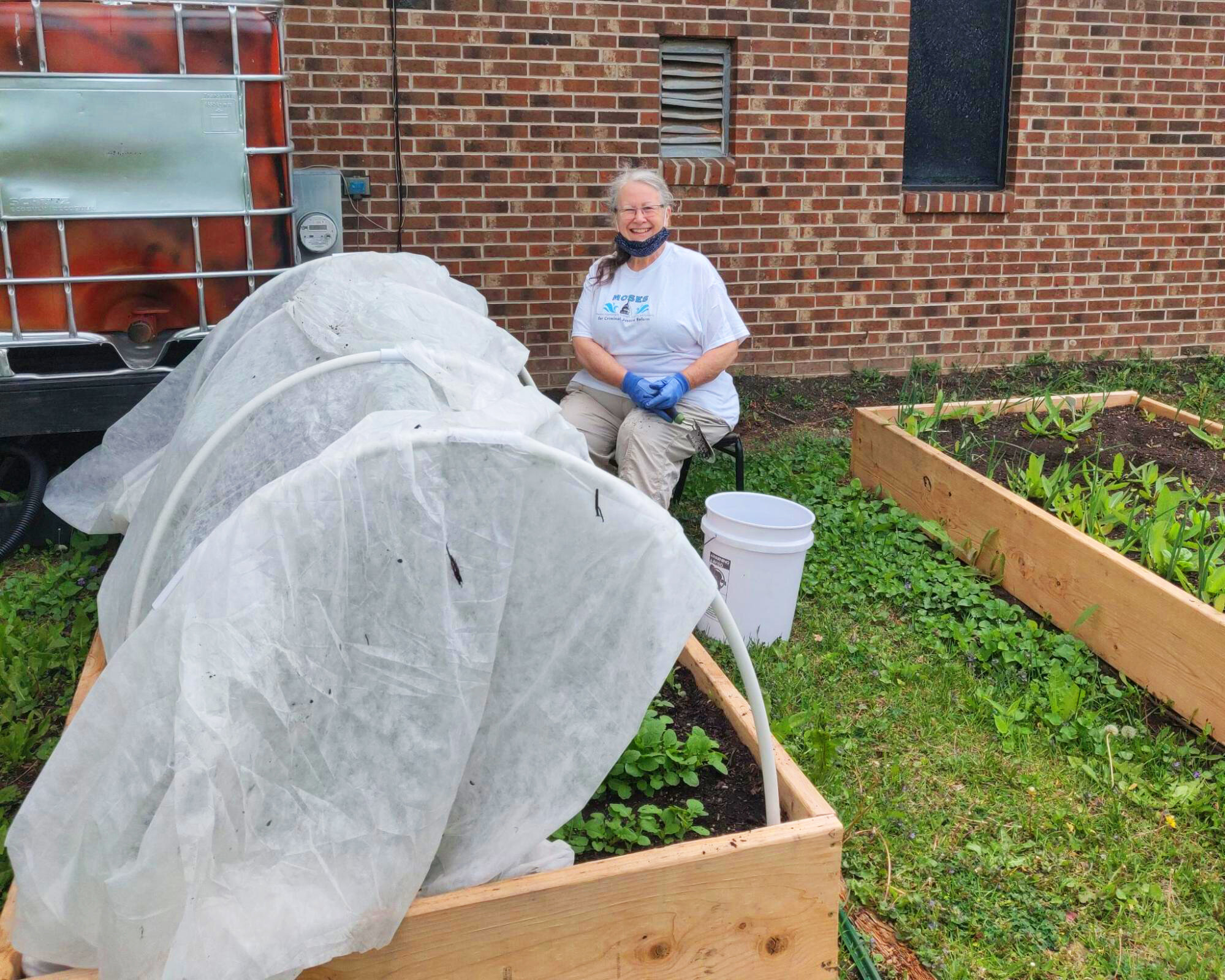
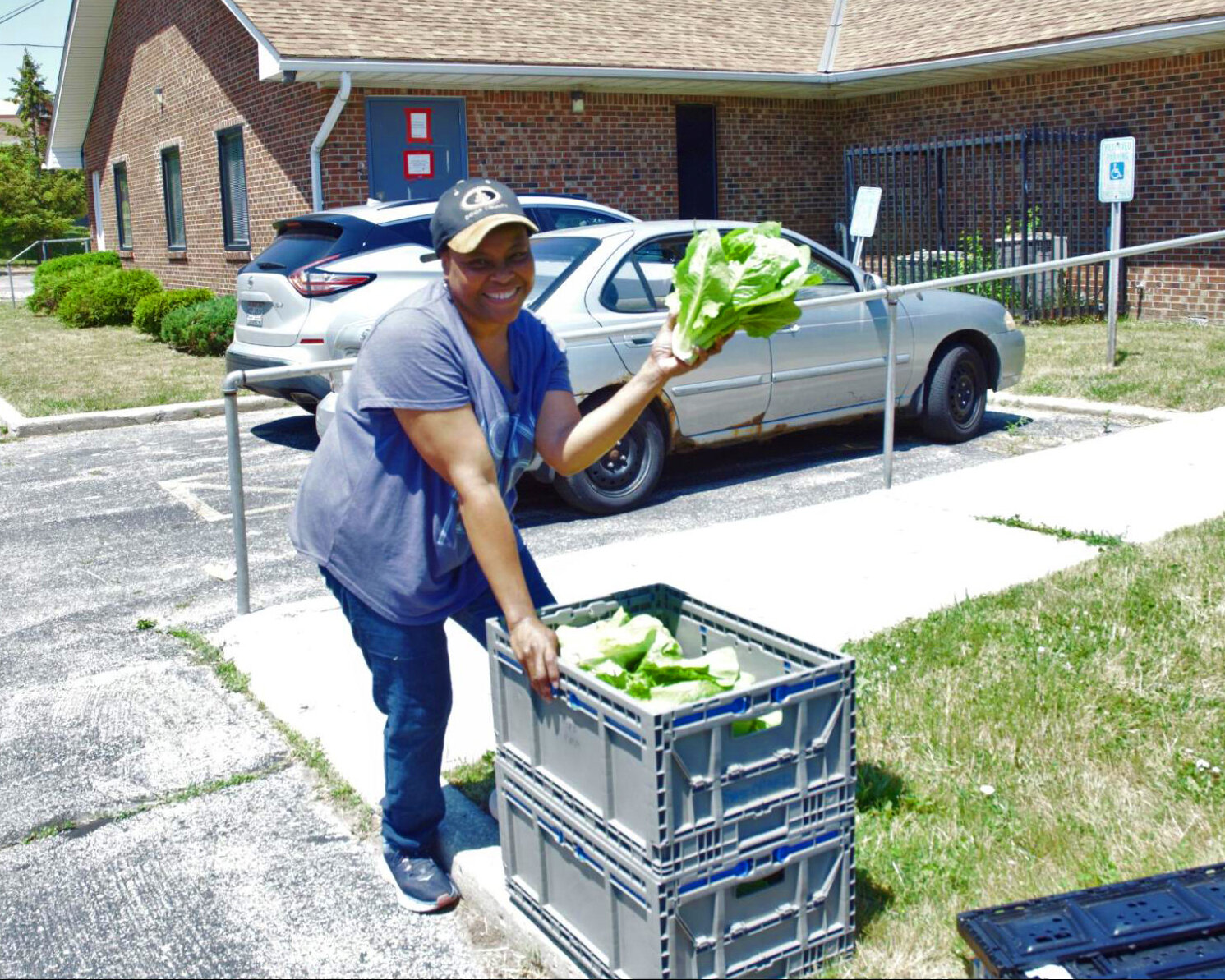
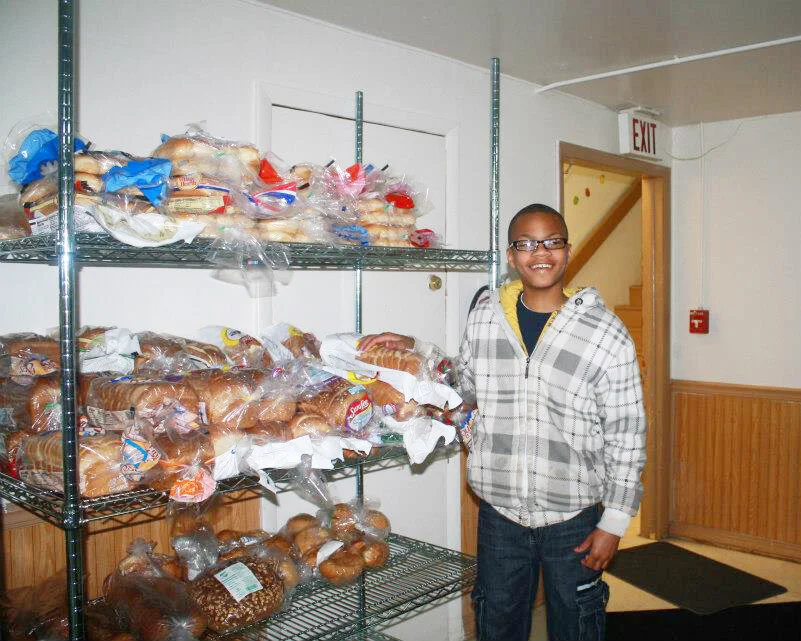
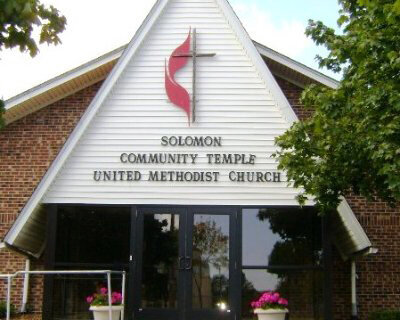
In 2021, Solomon Community Temple United Methodist Church joined Groundwork’s Milwaukee Grows Garden Network. Located on Martin Luther King Jr. Drive, Solomon Community Temple is a valuable community resource in Milwaukee’s Harambee neighborhood. Solomon Community Temple collaborates with Groundwork in two important ways: 1) the Temple’s in-house foody pantry, called the Helping Community Food Pantry, receives donations from Groundwork’s Shared Harvest food rescue programming, 2) the Temple’s community garden is now part of the Milwaukee Grows Garden Network.
Originally called The Helping Place, the pantry came to fruition in the early 1990’s when community members saw the need for food at no cost to local families. With support from Feeding America and Hunger Task Force, the pantry’s operators were able to serve dry goods, meats, eggs, milk and more.
In 2010 the pantry moved from St. James United Methodist Church on 24th and Keefe to its current location, and in 2017 they changed the name to the Helping Community Food Pantry. The pantry is run by dedicated volunteers like Billie, Dorothy, Dee and Katharine. Billie has been volunteering since 2009.
The food pantry opens its doors each Thursday and typically serves 15-30 pantry shoppers each week. The pantry aims to give out more than food. Solomon Community Temple sees the food pantry as just one part of their work in community building, uplifting folks and creating a sense of true belonging. The pantry currently offers free clothing, maintains a community garden, and is taking steps to be able to connect pantry shoppers to social services like housing and employment.
As Solomon Community Temple is only one mile south of the Maglio Farm, which serves as the central operating location of Groundwork’s Shared Harvest programming, the Helping Community Food Pantry was a natural partner to help Groundwork distribute the food we rescue to those who might benefit most from having it.
Furthermore, the garden is a critical piece the Temple’s larger mission. Named, the Belonging Place, the garden will be used not just to provide fresh produce to pantry shoppers, but to host community events, programs, outdoor worship, and more. Solomon Community Temple is partnering with UWM Community Design Solutions and MMSD in addition to Groundwork Milwaukee to develop green infrastructure in the garden.
Groundwork’s partnership with Solomon has helped install raised beds and a rainwater harvest structure. There are plans to make the space more ADA accessible. Donations are always welcome to assist with garden infrastructure like little lending libraries, benches, and bike racks.
A picture before (left) and after (right) Groundwork collaborated with Solomon Community Temple to build new raised beds in the Belonging Place Garden.
In the immediate future, Solomon volunteer, Billie, is working to create a fund to provide carts for pantry shoppers without transportation. Pantry boxes are often chock-full of food and heavy. These carts would help residents that travel by foot to safely and efficiently get their groceries home. The ministry for these carts would be named in tribute to Kelly Quarles, a pantry volunteer who passed away last year due to covid-19 complications. Solomon Community Temple is running a fundraising campaign to support this goal. You can read more about this fundraiser, including how to donate, here.


